NCFRPC Chair, Robert Wilford, Ends Long Tradition of Allowing Public Questions of Guest Speakers
Posted September 28, 2019 06:45 pm | Updated September 29, 2019 08:35 am**
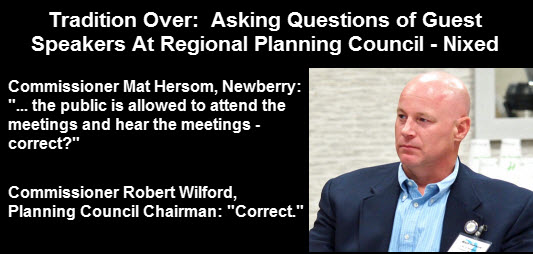
Commissioner Hersom, shortly after his comment
that the public is "allowed" to attend and hear
meetings.
LAKE CITY, FL – The present Chairman of the North Central Florida Regional Planning Council, Alachua City Commissioner Robert Wilford, recently ended a long tradition of allowing questions from the public or the press of the Planning Council's guest speakers.
Background
The North Central Florida Regional Planning Council (NCFRPC) is an association of general purpose local governments organized under Chapter 163 of the Florida Statutes and interlocal agreement. The only member county in the NCFRPC region that has not be designated as a Rural Area of Critical Economic Concern* by the legislature is Alachua County, which provides 1/2 the population in the region and is probably responsible for over half its revenue.
The Columbia County Observer
Beginning in 2012, the Columbia County Observer has regularly covered the NCFRPC. During that time, it has been the practice of the chairman to allow questions from the public and the press of Planning Council presenters, many of whom are on the public payroll or receive public funding. This reporter does not recall any member of the public asking a question, as visitors from the public are few and far between.
Every year the Planning Council chooses a new chairman.
Before Chairman Wilford there has never been a problem with this reporter asking questions of visiting speakers. They all survived. No one ever said they thought the questions were unfair.
Many of the Council members appreciated the questions.
Executive Committee: August 22
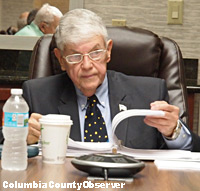
Commissioner Robert Wilford presides over the
Executive Committee.
At the August 22, 2019 meeting of the Executive Committee, the place through which all things are funneled before they reach the full Council, Chairman Wilford said he read the bylaws and they do not give anyone, other than council members the right to question guest speakers.
Chairman Wilford explained, "Presentations are informational type things. Citizens will not be allowed to comment on that. People don't get up and ask questions, they get up and start giving diatribes."
This is not true at the Planning Council, although it may be true at other meetings Mr. Wilford attends.
A short while later, Mr. Wilford said that reporters are supposed to ask questions before the meetings, after the meetings, on the phone, or via email.
He said, "You're the first reporter that I've seen in 22 years that does that. And that's on the record."
Rule Change Comes Before the Council
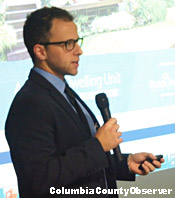
Kody Glazer, legal director of the Florida
Housing Coalition, gives his presentation to the
Council.
The evening's presenter, Kody Glazer of the Florida Housing Coalition, made his presentation. It wasn't clear how many council members had ever heard of the Coalition. Your reporter waited until the public comment section of the meeting.
Then, Mr. Wilford explained that the Executive Committee was seeking a rule change regarding comments made to the Council.
Your reporter addressed the Council regarding the proposed amendment to the rules: "Guest speakers, who are on the mark and know what they are doing, have no problems answering questions from anybody. I respectfully ask that the meeting rules be changed to allow any citizen that shows up at this meeting to ask any guest speaker, of whom many are on the public payroll, any question after the council members get done with their questions and comments."
Mr. Wilford responded: "I think we're within the guidelines. As far as asking questions from the press, normally the press asks questions before a meeting or after a meeting, or, if you want something asked, you can ask a council member to present your question. I don't think tonight we are going to address that issue."
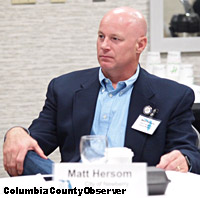
Newberry's Matt Hersom, after his comment that
the "public is allowed to attend meetings."
Mr. Wilford asked for comments from the Council.
City Commissioner Mat Hersom of Newberry asked, "The presentations by guest speakers, are they for the edification of the council themselves and the public is allowed to attend the meetings and hear the meetings – correct?"
Mr. Wilford answered, "Right."
Your Reporter Addressed the Issue During Public Comment
Your reporter explained that attending a public meeting was not an accommodation, but a right: "It's not an accommodation that people show up at this meeting. It is a constitutional right... There is no rule that people that are on this board - that people have to show up every meeting. There's no rule that the public has to show up. The people have the right to show up because it is guaranteed in the U.S. and Florida Constitution. To not give anybody the right to question somebody that makes a presentation, I think is totally out of line."
"I do have a question for Mr. Glazer. How does his group get in touch with the local communities and local communities in this region to let them know exactly what it is that you do?"
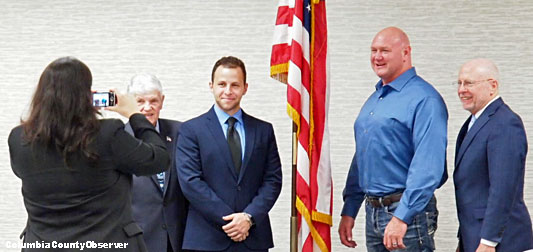
The Florida Housing Coalition's Glazer had his
photo snapped and disappeared. Photo from left
to right: Lauren Yaetter snapping photo, Robert
Wilford, Kody Glazer, Don Hale, Scott Koons.
Chairman Wilford Digs In: No Answers Here
Usually, a chair will ask if a person would like to answer the question.
Mr. Wilford did not. He said, "Mr. Glazer, I think they can go to the website and get all the information they need as far as contacting you."
Epilogue
Your reporter waited around after the meeting until the last photo was taken, sure that Mr. Glazer would have heeded Mr. Wilford regarding after meeting questions; come over; introduced himself; and answered the question.
Mr. Glazer must have been in a rush: maybe next time.
-----------------------------------------------------------
* Rural Areas
of Critical Economic Concern are areas of
persistent poverty: not counting Alachua County,
this region has the highest levels of persistent
poverty in the state.
Rural Areas of Critical Economic Concern also
have depressed high school graduation rates;
depressed income levels; and poor high speed
internet access.
The state now calls Rural Areas of Critical
Economic Concern, Rural Areas of Opportunity:
it's Florida.
** caption added under lead graphic
